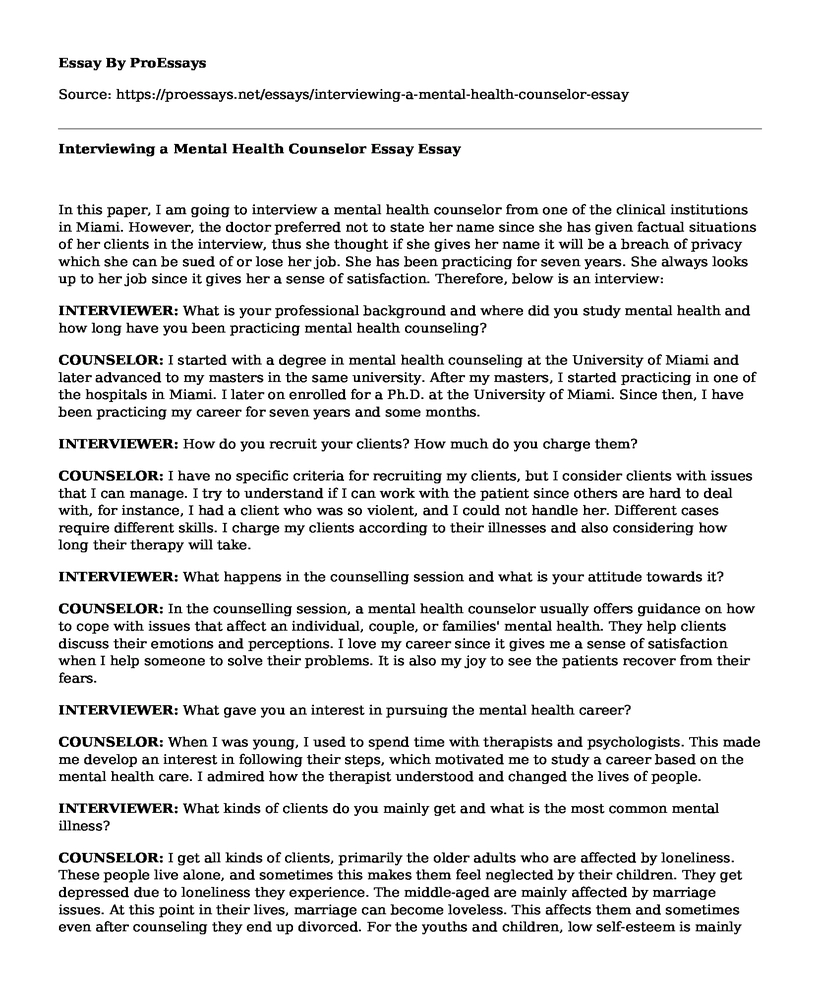In this paper, I am going to interview a mental health counselor from one of the clinical institutions in Miami. However, the doctor preferred not to state her name since she has given factual situations of her clients in the interview, thus she thought if she gives her name it will be a breach of privacy which she can be sued of or lose her job. She has been practicing for seven years. She always looks up to her job since it gives her a sense of satisfaction. Therefore, below is an interview:
INTERVIEWER: What is your professional background and where did you study mental health and how long have you been practicing mental health counseling?
COUNSELOR: I started with a degree in mental health counseling at the University of Miami and later advanced to my masters in the same university. After my masters, I started practicing in one of the hospitals in Miami. I later on enrolled for a Ph.D. at the University of Miami. Since then, I have been practicing my career for seven years and some months.
INTERVIEWER: How do you recruit your clients? How much do you charge them?
COUNSELOR: I have no specific criteria for recruiting my clients, but I consider clients with issues that I can manage. I try to understand if I can work with the patient since others are hard to deal with, for instance, I had a client who was so violent, and I could not handle her. Different cases require different skills. I charge my clients according to their illnesses and also considering how long their therapy will take.
INTERVIEWER: What happens in the counselling session and what is your attitude towards it?
COUNSELOR: In the counselling session, a mental health counselor usually offers guidance on how to cope with issues that affect an individual, couple, or families' mental health. They help clients discuss their emotions and perceptions. I love my career since it gives me a sense of satisfaction when I help someone to solve their problems. It is also my joy to see the patients recover from their fears.
INTERVIEWER: What gave you an interest in pursuing the mental health career?
COUNSELOR: When I was young, I used to spend time with therapists and psychologists. This made me develop an interest in following their steps, which motivated me to study a career based on the mental health care. I admired how the therapist understood and changed the lives of people.
INTERVIEWER: What kinds of clients do you mainly get and what is the most common mental illness?
COUNSELOR: I get all kinds of clients, primarily the older adults who are affected by loneliness. These people live alone, and sometimes this makes them feel neglected by their children. They get depressed due to loneliness they experience. The middle-aged are mainly affected by marriage issues. At this point in their lives, marriage can become loveless. This affects them and sometimes even after counseling they end up divorced. For the youths and children, low self-esteem is mainly their issue, which in return causes depression.
INTERVIEWER: What theoretical approach do you use in your counseling?
COUNSELOR: In my counseling, I use different theoretical approaches, but mainly I use the cognitive theory. The theory is based on thoughts, behaviors, and emotions. As a doctor, I need to understand the client's attitudes, assumptions, and perceptions that may affect their thinking. The theory helps patients to recover by developing more functional thinking ways
INTERVIEWER: What happens during a counseling session and how do you assess progress among your patients?
COUNSELOR: In a counseling session, I assess the patient's general wellbeing. I try to help my clients understand their thoughts and feelings gradually. When they understand their thoughts, we try to come up with positive solutions that can help them to change their way of thinking. For example, someone with an eating disorder will be helped by using the disorder therapies. The assessment of such cases will involve questions on how they take their meals or maybe checking their weight. Intervention, in this case, can be done through self-help groups with people of the same disorder.
Reaction and Lessons Learned from the Interview
From the interview, I have learned that mental health counseling is not an easy task. It requires devotion, understanding, and patience with the clients. To practice mental health counseling, an individual need to be highly educated to understand the structure of human mentality. The interview was a success since the doctor was helpful. She provided all the information needed for the research.
A Thank you Letter to the Mental Health Counselor
CALISTA WISE
606 3727 ULLARCOOPER.STREET
ROSEVILLE NH 11523
12/02/2018
DR ANNE BEASLEY
MENTAL HEALTH COUNSELOR
MIAMI HOSPITAL
MIAMI 12345
Dear MS. Beasley,
I am deeply grateful for taking time to talk to me today. I sincerely appreciate your accommodating nature. Your insight about your career gave me a better understanding and the roles that you take in patients.
I am also thankful for the fact that you advised me to take a mental health course, which I will do in due time. I am looking forward to having another interview with you for more information. Thank you for your help.
Best regards.
Signature
Calista Wise
Cite this page
Interviewing a Mental Health Counselor Essay. (2022, Apr 04). Retrieved from https://proessays.net/essays/interviewing-a-mental-health-counselor-essay
If you are the original author of this essay and no longer wish to have it published on the ProEssays website, please click below to request its removal:
- Marriage Therapy Assessment Paper Example
- Employment Laws, Policies and Processes Essay Example
- An Argumentative Essay on How Sensitive People Are Today
- Self-Developer Award - The One Who Is a Lover of Knowledge
- Essay Example on Exploring Cognitive-Psychosocial Development: Vygotsky & Erikson
- Research Paper on Mercy Med Center: Creating a Diverse & Inclusive Workplace for Quality Care
- Essay Example on Developing a Diversity Training Plan: Strategies and Implementation







